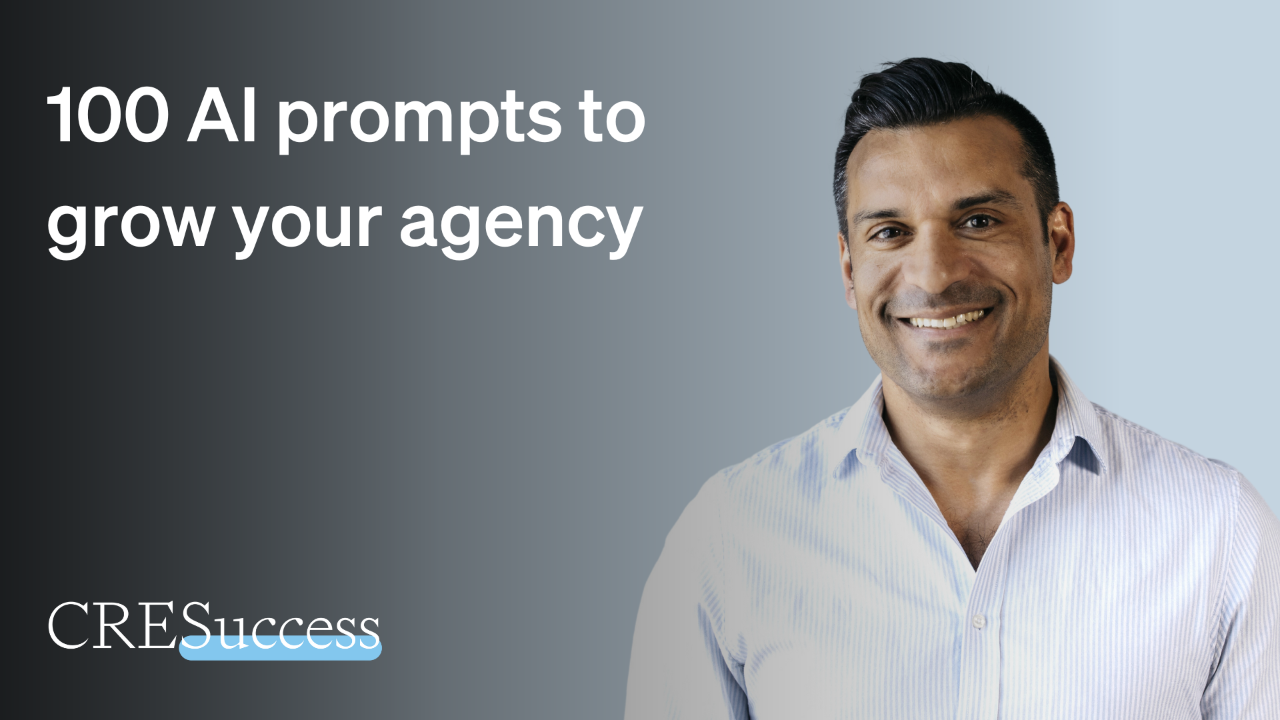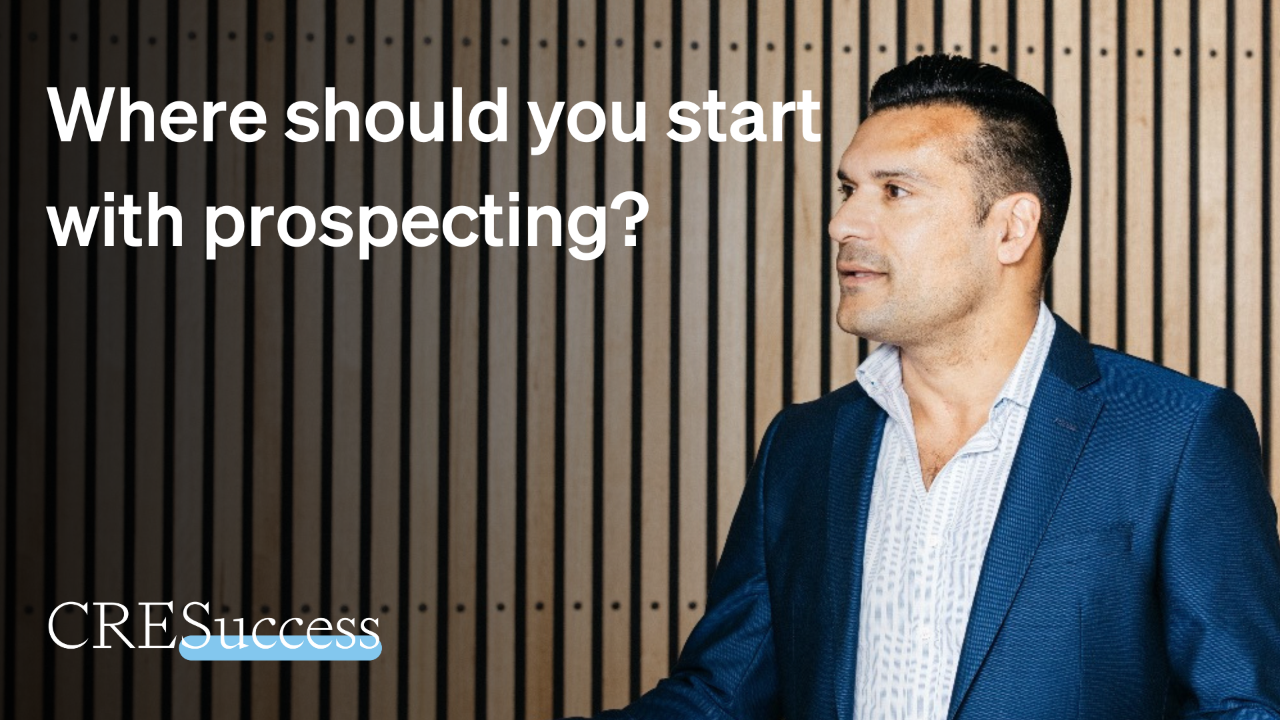Practical help for using AI in your commercial real estate business starts here.
Jul 09, 2025
CRE Success Principle: You may not be replaced by Al, but you could be overtaken by a competitor who knows how to use it better than you.
Are you feeling like you’ve fallen behind the AI curve? You’re not alone.
Many commercial real estate principals think AI is too technical or too time-consuming to learn. But you don’t have to be a tech head to start reaping the benefits.
In this week’s episode, I’m sharing how even non-technical professionals can start using AI to save time, grow revenue and build a stronger business.
From generating prospecting scripts to drafting retention campaigns, there are simple ways to make AI work for you – even if you’ve never used it before.
To help you get started, I’ve put together a free guide: 100 AI Prompts for Commercial Real Estate Agencies. These are practical, ready-to-use prompts covering 10 essential areas, including:
- Prospecting & pipeline growth
- Leadership & team development
- Client experience & retention
- Efficiency & systemisation
- Personal productivity
These purpose-built prompts are designed for tools like ChatGPT, Claude, Copilot and Gemini.
Plus, I’m sharing a bonus prompt that helps reveal blind spots you might not see.
Download your free copy here: cresuccess.co/100
Start using AI today to gain an edge over competitors who are still waiting to “figure it out”.
Episode transcript:
I was speaking to one of my good clients last week who mentioned that he was feeling a little bit left behind by the AI revolution. He's seen everything that's been going on over the past two or three years, and he realises he just hasn't done enough to keep up.
Well, while it's true that all of the tasks and functions that are performed by you and your team inside a commercial real estate business are unlikely to be replaced by AI, there is a good chance that if you don't actually create some level of skill and knowledge for using AI, you could be overtaken by a competitor who can use it better than you.
So, I want to give you 100 ways that you can be using AI inside your commercial real estate business.
This is Episode 228 of Commercial Real Estate Leadership. I'm your host, Darren Krakowiak. Thanks so much for joining us for another episode of the show.
I'm here to help commercial real estate principals to lead their people better, to grow their business faster and to have less stress in their lives.
Now, I've done a costume change for today. I usually do wear a polo, and if you're watching us on YouTube, you'll see that I'm wearing a hoodie because the winters are getting colder and I'm not getting any younger.
And rather than impact the awesome audio quality that we've got on this episode, because I record in this high-tech studio, which is actually my home office and risk putting the Dyson on and having that airflow affect the audio quality, I just put on a polo. Okay, so it is me with Polo.
If you are listening on Apple Podcasts or Spotify, what I've just said will mean nothing to you. But if you are watching us on YouTube, I just thought I would recognise that there has been a bit of a change. We'll go back to the regular costume once the weather warms up a bit.
So, today I want to talk about AI. And have you ever noticed, I don't know if you watch those videos that you see on YouTube around, like, “These are the top skills that if you have these skills, then you will always be employable”.
And it always used to talk about copywriting, about coding, and sales would be one of those skills. And there's a new skill that people are talking about now, and it's called an AI prompt engineer.
That is actually drafting/writing prompts that unlocks the power of AI, because a lot of people know how to use AI kind of like from a, you know, they know how to log into ChatGPT and type something in, but they're not using it to its full potential.
Now, I don't consider myself to be that advanced when it comes to AI, but I think I might be doing better than I realised because when I spoke to a, I'm in this mastermind with a group of entrepreneurs, which just started up a couple of months ago, and the topic of AI came up.
And one contribution I made to this discussion was, well, here's how I use AI to create my podcast.
And I talked about how I would use AI to help me generate ideas for episodes and help me to create the structure of the episode, and that we would then transcribe the episode using AI.
And that we would use other programs, like Opus is a new one that we are using now: What it does is it goes through the entire episode after we upload the video, it finds what it thinks are the most viral moments from the episode.
And there aren't many from what I do, but if it scores them, it then edits them. It puts in a B-roll video. A B-roll video is like when a talking head is talking on a short or on a reel, and then you see it cut to some other stock footage.
It creates that for you, and then it, you know, gives you the video all done. It will even create some posts for different platforms if you ask it to, and it can change the dimensions and all this sort of stuff. It's really, really cool.
And what that means is that I'm using AI to help me, even though I'm not a tech wizard and I'm not an AI prompt engineer expert. But I'm benefiting from it.
And I think the way that you can benefit from AI is to just start using it. Because the more you start using it, the more comfortable you'll become with it and the more experienced you'll be with it.
I learned a new phrase the other day - Generation Alpha. Did you know about this one? This is people that are born from 2010 and these are the generation of people that everything that is going on with this revolution in terms of AI and technology is just going to be second nature to them.
And of course, it's not second nature for anyone who's listening to this show, because I'm assuming I don't have anyone who's under 15 years of age listening to this show. So, we kind of need to get more comfortable with this stuff by using it.
And that's why I've created a free resource to help you do just that. It's got 100 AI-engineered prompts for commercial real estate agencies.
These are the prompts that I would recommend to my clients. These are not even just the prompts, these are the things that I suggest my clients reflect on, think about so that they can grow their business in a more sustainable way.
If you want to grab that document, it's available to download for free cresuccess.co/100. And inside it, you're going to find purpose-built prompts that you can copy and paste into tools like ChatGPT, into Claude, into Copilot, into Gemini.
And we've got the prompts sorted into 10 different categories. So, there's 10 prompts for each of these 10 categories.
The categories are:
- Revenue and growth
- Prospecting and pipeline power
- Leadership and accountability
- Team development and culture
- Client experience and retention
- Efficiency and systemisation
- Brand and marketing authority
- Strategy and vision
- Content and communication
- Personal productivity and mindset
Let me just give you a few of my favourites to give you a taste of the types of prompts that we are providing under some of these categories.
So, prompt number 1, under the category of revenue and growth is, “Create a quarterly growth plan for a commercial real estate agency that generates X.X million dollars in annual revenue, but is stuck at capacity. Prioritise opportunities to increase revenue per agent, improve market share and build a more leveraged sales engine that doesn't rely solely on the principal or a small number of top performers.”
So that really, I guess, builds upon what we were talking about last week. If you are looking to create some incremental growth in your business, if you've hit a plateau and you want to get above that, this could identify some areas where you could look to drive more growth in your business.
Prompt number 13 under the category of prospecting and pipeline power is, “Create 10 call intro variations for agents prospecting, landlords with expiring leases. Use a tone that is confident but not pushy with a service-oriented mindset.”
And you could take that prompt and instead of saying that it's for agents prospecting landlords with expiring leases, you could change the scenario and provide another 10 call intro variations for any scenario that you might like to think of.
Prompt number 43 from the guide, which is all about client experience, is to “Develop a retention campaign for property management clients who are reaching milestones where some clients may consider alternatives. Include talking points, key proof points and optional value-add service upgrades to reinforce staying power.”
So, the point of that prompt is if you've identified that there is something that occurs, which then drives or at least creates a little bit of churn in your property management business, let's get in and have a conversation before that churn event occurs so that we can reduce the amount of churn that that particular trigger creates.
Another prompt is number 59, around efficiency and systemisation, which is “Generate a process map for transitioning a property from leasing to property management after a tenant has been secured. Include internal handoff steps, system upgrades and client communication.”
So, once the property is being leased by this leasing agent, what are all the things that the property management team needs to do? We need to create a process around that, and that is a prompt that can help you get started with that.
And prompt number 89 from the guide is all about content and communication, and it just says “Draft a thank you note an agent can send to a prospective client after a listing presentation. Emphasise the value of the meeting, restate the alignment and offer a clear next step.”
So that's just five. There are 100 of them in this guide, and you know, they're really practical tools that are going to help you save time, grow revenue and empower your team.
So let me just give you a couple of points around context because the way you use this guide is really going to be important in terms of you getting the benefit of it.
The more specific your instructions are, the better your results. So, you can provide more specificity to these prompts when you are putting them into your preferred AI engine.
At the same time, you can and you should, I think, upgrade or update your custom instructions inside a program like ChatGPT, just by clicking customise ChatGPT, and that will give the program some baseline information about you and how you want it to respond.
So, what do you want it to know about you, and how do you want it to respond.
Okay, so if you give that more relevant and specific information, then it's going to have that context when you put in the prompts at the same time.
In ChatGPT, you can click settings and then personalisation and then toggle recent chat history and referenced saved memories.
So ChatGPT continues to learn from interactions it has from you, and that, again, is also going to ensure that every single response is even more relevant.
And I want to give you a special bonus prompt because you are still watching or listening to this episode, and this one is not included in the free resource. But a client gave it to me and it directly relates to the fact that we want to be continuing to store our history because this one only works if you are having ChatGPT reference your chat history and save memories.
And the prompt is this, “Given what you know about me, what blind spots or deficiencies do you see that may impact my future success?”
So what this prompt is doing is it's allowing ChatGPT, or whatever program you are using to analyse the things that you're talking about, but also understand if you're looking at them in a certain way, which might cloud your judgment if there may be, is a bias that you have or perhaps there's something you are ignoring that ChatGPT can see that you should not be ignoring and that you need to be starting to consider more.
So, I'll give you that prompt again because it's not in the guide. “Given what you know about me, what blind spots or deficiencies do you see that may impact my future success?”
And a few my clients have run that prompt and they got some, let's just say, interesting responses.
One thing I want you to remember as well is to make sure that you're using follow-up prompts to refine the AI-generated outputs that you are getting.
So, when you see a response that you get from AI, you cannot accept that. You can go back to it and say, “Hey, can you please rewrite this for a more experienced client?” Or you might say something like, “I want you to make this shorter and punchier while still retaining my tone of voice.”
That's you training the AI the same way that you train a person that you're working with. You've got to give AI meaningful feedback so that it can continue to improve, iterate and provide you with the best possible responses.
So, really the way to get better with AI is just to use it more. If you want to start using AI more to your advantage, whether you are curious about it, whether you know that you need to use it more than you already are, or if you're ready to go all in.
Or perhaps you just want to identify, are there some ways that perhaps I'm recommending to use it that you haven't thought of yet, you can get all of the information, the answers to those questions by going to cresuccess.co/100
Grab the full list of prompts. It's completely free. It works with ChatGPT or Claude, or Copilot or Gemini, or any AI assistant you care to name. And, you know, it's going to give you a serious edge in your business.
So, you don't have to be an AI expert to start benefiting from it. You just need to start using it. And maybe this will be the leg up that you need to start using it with a little bit more intent.
So that is our episode for today. Thank you so much for listening, and I will speak to you soon.








